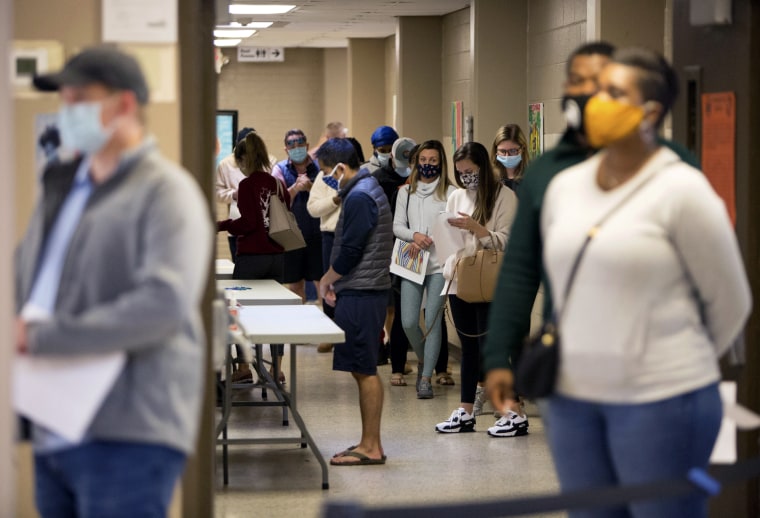Latino voters aren’t often at the forefront when it comes to elections in Georgia, but with control of the U.S. Senate on the line, those hoping to turn out the growing electorate aren’t easing up.
Which party ends up in the majority could come down to at least one runoff in Georgia and potentially a second. One Republican incumbent, Kelly Loeffler, and Democrat Raphael Warnock are already headed to a runoff after they were the top vote-getters on Election Day but failed to secure the majority needed to win outright.
The race between Georgia’s other Republican senator, David Perdue, and Democratic challenger Jon Ossoff is too close to call, according to NBC News, but may be headed for a runoff as well.
The Latino electorate in Georgia has been growing and its turnout has been increasing, outperforming national Latino participation rates in 2016 and 2018, according to Jerry Gonzalez, executive director of the Georgia Association of Latino Elected Officials, a nonprofit focused on civic engagement.
Latinos are 5 percent of Georgia’s electorate, with about 377,000 Latinos eligible to vote, and about 250,000 registered. An NBC News analysis of exit poll data found that Latino voters preferred Joe Biden over President Donald Trump, 62 percent to 37 percent.
“It is a great position to be in where Georgia can control the Senate," said Gonzalez, adding that Latino voters "care about access to health care, Covid-19 response and the Covid impact and of course immigration reform."
The state saw a marked increase in its Latino immigrant population, helping create a generation of American children of immigrants who are now voters. Since 2000, the overwhelming majority the state's Latino growth has been from U.S.-born Latinos. Gonzalez said the general Georgia Latino voter is a millennial.
The state’s agriculture, carpet and service industry are dependent on the immigrant Latino population, including people who lack legal status, Gonzalez said, adding that Georgia industry "would collapse without it."
Meredith Brasher, a spokeswoman for Warnock, said the campaign has incorporated Latino outreach into its campaign, including hiring a Latino outreach coordinator, whose name she was not ready to disclose. The campaign has also held meet-and-greet events with Latinos, purchased ads in the Latino print market, made pages of its website available in Spanish and made Warnock’s campaign message relevant to concerns of Latinos. The campaign also has hosted phone/text banking events for Spanish speakers, Brasher said.
The National Republican Senatorial Committee is equating Democrats with socialism, messaging that has resonated among a segment of Latino voters, especially in Florida.
"Jon Ossoff and Democrats are pushing a radical agenda that would fundamentally change America," said NRSC spokesperson Paige Lindgren in a statement.
The NRSC also attacked a recent comment by Ossoff that change is coming to America, saying it means "a path straight to socialism" that includes "extreme" ideas, including statehood for Puerto Rico. Some of the island's top pro-statehood leaders are Republican.
Voto Latino, which focuses on registering and turning out Latino voters, announced this week that it will reopen a voter registration campaign in Georgia. Registration for the Jan. 5 runoff can continue through Dec. 7. Voto Latino hopes to raise at least $2.5 million for the effort.
“This cycle is not over and we will be investing heavily in the state to guarantee that all voters in Georgia have the opportunity to make their voices heard,” Maria Teresa Kumar, Voto Latino president and CEO, said in a statement.
Democrat political strategist Chuck Rocha, a former senior adviser to Bernie Sanders’ 2020 presidential campaign, said he's working to help groups turn out Latino voters in the state.
Rocha formed Nuestro PAC, a political action committee, to invest in Latino voter registration and turnout this cycle. The PAC spent about $8 million in Michigan, Pennsylvania, Arizona, Nevada and North Carolina. The money helped create and pay for Spanish- and English-language TV, digital, radio, Pandora ads and to do phone banking and texting in English and Spanish.
His outreach plan for the runoffs includes conveying the message that from construction workers to doctors, lawyers and engineers in the state, Latinos are building the structure of Georgia, he said.
Rocha said there are more Latinos registered in the state with no party preference than as Democrats.
Many of Georgia's Latino voters can be found in Gwinnett and Cobb counties, which turned blue in 2016, remained blue in 2018 and were even more blue in 2020, he said.
In Gwinnett County, a suburban county of Atlanta, Biden got 75 percent of the vote in precincts with high concentrations of Latinos, according to an analysis by the University of California, Los Angeles Latino Policy and Politics Initiative.
Gonzalez pointed out that two sheriff’s candidates in those counties who reaffirmed their campaign pledges to end participation with federal authorities in immigration enforcement—through the so-called 287(g) program—won elections.
Latino get-out-the-vote efforts in Georgia often are part of a collaborative effort with other communities of color. With limited resources, the different communities began working collectively years ago, said Gonzalez.
“The one thing we know for sure is our destinies are shared and linked. Black, Asian and Latino communities have shared destinies in Georgia, and we’ve been working across racial and ethnic lines not just for power for Latinos, but for all communities,” said Gonzalez.
Follow NBC Latino on Facebook, Twitter and Instagram.


